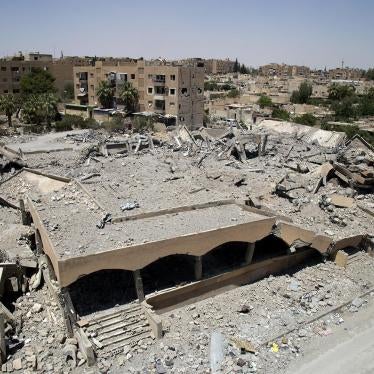(Beirut) - Governments of the Middle East and North Africa region should sign the new international treaty banning cluster munitions, Human Rights Watch said today. So far, Lebanon and Tunisia are the only two countries from the region to have signed the Convention on Cluster Munitions, which was opened for signature in December 2008. Lebanon signed the treaty in December 2008, and Tunisia signed on January 12, 2009.
The deadly weapon, which leaves behind sub-munitions that can kill for years, has been used in the region - in particular in Lebanon, Iraq, Kuwait, Israel, Saudi Arabia, Syria, and Western Sahara. Human Rights Watch, with a coalition of other groups, campaigned for an international treaty to deal with cluster munitions after Israel's massive use of these weapons in southern Lebanon in July-August 2006. These weapons left large swaths of Lebanon contaminated by the deadly unexploded sub-munitions, which since the end of fighting have killed or wounded 218 civilians as well as 47 people who were trying to locate and remove them.
"Lebanon and Tunisia have recognized how important it is to free the world of these deadly weapons," said Sarah Leah Whitson, director of the Middle East and North Africa division of Human Rights Watch. "No Arab state has used cluster bombs in the past 15 years, and they now should promise never to do so in the future and join this treaty."
A total of 94 countries, including Lebanon, signed the Convention on Cluster Munitions in Oslo, Norway on December 3-4, 2008. The treaty is now open for signature at the United Nations in New York. Thirteen states from the region participated in meetings that led to the creation of the convention, but have not yet signed: Algeria, Bahrain, Egypt, Iraq, Jordan, Kuwait, Libya, Morocco, Oman, Qatar, Saudi Arabia, United Arab Emirates, and Yemen. Iran, Israel, and Syria refused to participate in the process that created the convention, and also have refused to sign the agreement.
"The more Arab states sign, the greater the stigma associated with using this weapon in the region and the harder it will be for Israel or any other state to use this weapon," Whitson said.
The Convention on Cluster Munitions is a major advance in the protection of civilians both during and after armed conflict. It prohibits the use, production, transfer, and stockpiling of cluster munitions. The convention also requires the clearance of affected areas within 10 years and destruction of stockpiled cluster munitions within eight years, and includes assistance provisions to help affected nations with clearance and victim assistance. The new treaty also includes a groundbreaking provision requiring states that join it to take an active role in discouraging other nations from using cluster munitions in joint military operations.
"It's not enough for Arab leaders to complain about the horrors of cluster munitions in Lebanon and other countries in the region," said Whitson. "They should work to prevent any future use of this weapon by vowing never to use it themselves."
For more Human Rights Watch reporting on cluster munitions and the treaty banning their use, please visit:
https://www.hrw.org/en/category/topic/arms/cluster-munitions








